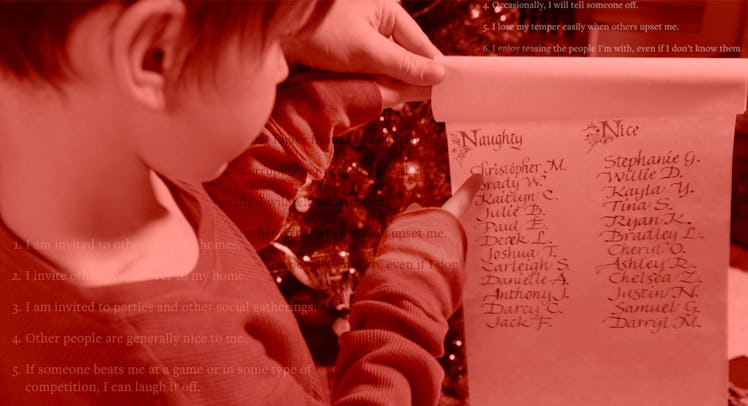How to Scientifically Measure Whether a Kid is Naughty or Nice
Most dads are lazy Santas. They deliver gifts with abandon, seldom making lists and never checking them twice. Here's how to calculate your kid's niceness.

Let’s face it — most dads are lazy Santas. They deliver gifts with abandon, seldom making lists and rarely checking them twice. But for the rare scientifically rigorous father, Christmas is the right time to take an actual accounting. Have your children been naughty or nice? And how would one go about measuring niceness anyway? Who’s to say whether a child is nice?
One approach, known as sentiment analysis, involves plumbing your child’s spoken and written words for key phrases that reveal his or her attitude. Data junkies have turned to sentiment analysis algorithms in the past to create platforms such as the (now-defunct) Klaus Score, which analyzed a user’s social media presence to determine how “nice” he or she had been over the past year. Alas, sentiment analysis software is not within the toolbox of the average dad. Others have tallied up juvenile conviction rates and school absenteeism to measure “naughtiness” but, again, such data holds little practical implication for most parents. Just because your kids don’t cut class or end up in juvie doesn’t mean they aren’t naughty. And it doesn’t mean they’re nice.
Fortunately, there’s a simpler way — a test, conceived by psychologists, tested on kids, and relied upon by researchers around the world — that measures whether your child is naughty or nice. Developed by Stephen Whiteside of the Mayo Clinic in 2016, the scale was specifically designed to help parents gauge the objective “niceness” of their children, without bias.
Meet The Friendships And Social Skills Test (FASST)
Ask your child to answer the following questions with “strongly agree” (4 points), “agree” (3 points), “disagree” (2 points), or “strongly disagree” (1 point):
- I am invited to other people’s homes.
- I invite other people over to my home.
- I am invited to parties and other social gatherings.
- Other people are generally nice to me.
- If someone beats me at a game or in some type of competition, I can laugh it off.
- I am able to wait my turn in line behind others.
- I say nice things to people without being prompted.
- I am careful to follow the rules, such as being quiet during meetings.
- I ask other people questions to find out how they’re doing.
Now, ask your child the following questions, but reverse the scoring system (that is, “strongly agree” is worth 1 point, while “strongly disagree” is worth 4 points).
- I am often told that I need to be nicer or more considerate.
- I don’t feel that I have friends to count on in a pinch.
- I tend to interrupt other people while they’re talking.
- Occasionally, I will tell someone off.
- I lose my temper easily when others upset me.
- I enjoy teasing the people I’m with, even if I don’t know them very well.
OK, I Have The Final Score…What’s It Mean?
A perfect score on the niceness scale is 60 — this means that your child strongly agrees that he or she engages in all of the “friendship activities” and displays “positive social skills”, while strongly denying that he or she feels victimized by peers, or exhibits negative social behaviors. Such a child is presumably very nice (or very bad at self-assessments). As with any such scale, there’s a degree of subjectivity. But the closer your child is to 60, the more confident you can be that he or she deserves presents this year. The lowest score is 15. Coal may be in order.
My Kid Scored, Um, Low. Now What?
It really depends on which questions dragged down their niceness scores. Some are easily remedied — for instance, if your daughter never invites friends over to play, she can fix that by picking up the phone. Others are easily taught. If your son reports interrupting people often, not waiting in line, or not following instructions, a quick lesson in manners may set him straight. Other barriers to niceness are more insidious. Children who lose their tempers easily or cannot graciously lose a game may need to seek counseling to learn strategies for keeping their feelings in check. The niceness scale is clean, in that it gives us an easy score, but messy in that the reasons behind that score send a lot of different messages about how to improve it.
Regardless of your child’s naughtiness or niceness, we’re comfortable advising you to give them presents this holiday season (unless you celebrate Chanukah, in which case don’t get us started). But after New Year’s, perhaps make it a resolution to improve that score. Nobody deserves a lump of coal. But it sure would be nice to earn that new bicycle next year.
This article was originally published on